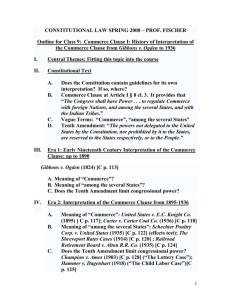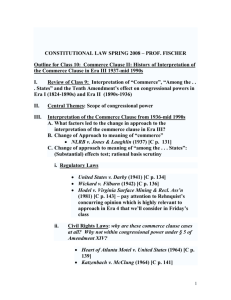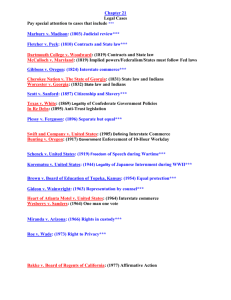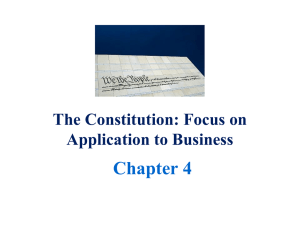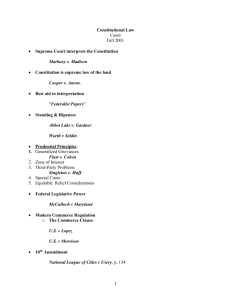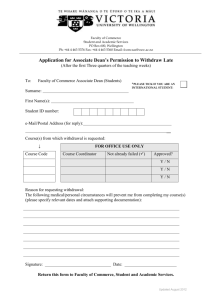Petitioner's reply brief in Swedenburg v. Kelly, 03-1274
advertisement
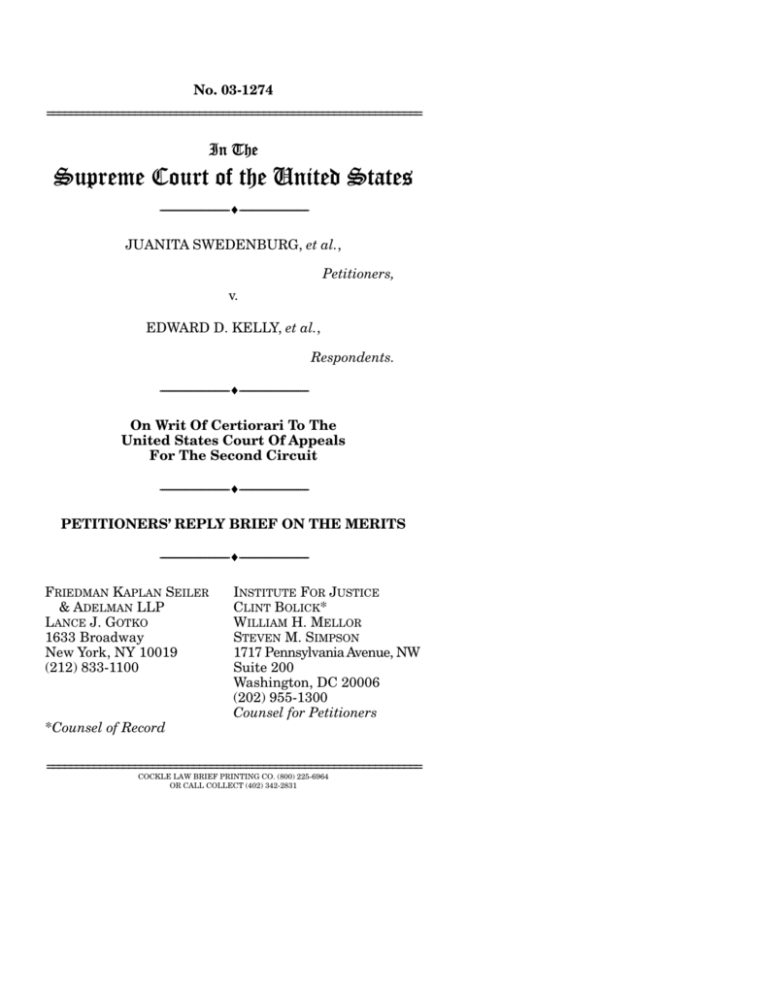
No. 03-1274 ================================================================ In The Supreme Court of the United States ---------------------------------♦--------------------------------JUANITA SWEDENBURG, et al., Petitioners, v. EDWARD D. KELLY, et al., Respondents. ---------------------------------♦--------------------------------On Writ Of Certiorari To The United States Court Of Appeals For The Second Circuit ---------------------------------♦--------------------------------PETITIONERS’ REPLY BRIEF ON THE MERITS ---------------------------------♦--------------------------------FRIEDMAN KAPLAN SEILER & ADELMAN LLP LANCE J. GOTKO 1633 Broadway New York, NY 10019 (212) 833-1100 INSTITUTE FOR JUSTICE CLINT BOLICK* WILLIAM H. MELLOR STEVEN M. SIMPSON 1717 Pennsylvania Avenue, NW Suite 200 Washington, DC 20006 (202) 955-1300 Counsel for Petitioners *Counsel of Record ================================================================ COCKLE LAW BRIEF PRINTING CO. (800) 225-6964 OR CALL COLLECT (402) 342-2831 i TABLE OF CONTENTS Page TABLE OF AUTHORITIES ........................................... ii ARGUMENT................................................................... 1 I. NEW YORK’S DISCRIMINATORY AND PROTECTIONIST DIRECT SHIPPING BAN CONSTITUTES A PER SE VIOLATION OF THE COMMERCE CLAUSE ............................. 1 THE WILSON ACT, WEBB-KENYON ACT, 21ST AMENDMENT, AND THIS COURT’S JURISPRUDENCE ALL EMBRACE THE PRINCIPLE OF NONDISCRIMINATION ....... 6 A DECISION ALLOWING DISCRIMINATION WOULD COLLIDE WITH OTHER CONSTITUTIONAL GUARANTEES.............................. 16 THE PROPER REMEDY IS TO EXTEND REGULATED DIRECT SHIPPING ON NONDISCRIMINATORY TERMS ............................. 17 CONCLUSION ............................................................... 19 II. III. IV. ii TABLE OF AUTHORITIES Page CASES Bacchus Imports v. Dias, 468 U.S. 263 (1984)... 3, 4, 6, 14, 15 Bousely v. United States, 523 U.S. 614 (1998) .................. 18 Bowman v. Chic. & N.W. Railway Co., 125 U.S. 465 (1888) ............................................................................ 8, 9 Brennan v. So. Express Co., 90 S.E. 402 (S.C. 1916) .........11 Brown-Forman Distillers Corp. v. N.Y. St. Liquor Auth., 476 U.S. 573 (1986) ................................. 2, 3, 4, 14 Calif. Retail Liquor Dealers Ass’n v. Midcal Aluminum, Inc., 445 U.S. 97 (1980) .............................. 7, 12, 13 Califano v. Wescott, 443 U.S. 76 (1979) ............................. 18 Capital Cities Cable v. Crisp, 467 U.S. 691 (1984) ....... 7, 14 Clark Distilling Co. v. Western Md. Railway Co., 242 U.S. 311 (1917) .........................................................11 Craig v. Boren, 429 U.S. 190 (1976) .............................11, 12 Dean Milk Co. v. Madison, 340 U.S. 349 (1951) ................. 3 Halliburton Oil Well Cementing Co. v. Reily, 373 U.S. 64 (1963) ................................................................... 3 Healy v. The Beer Inst., 491 U.S. 324 (1989)....... 3, 6, 14, 15 Heublein, Inc. v. S.C. Tax Comm’n, 409 U.S. 275 (1972) ................................................................................ 5 Hicklin v. Orbeck, 437 U.S. 518 (1978) ............................. 16 Hostetter v. Idelwild Bon Voyage Liquor Corp., 377 U.S. 324 (1964) ............................................... 6, 13, 15, 19 House of York v. Ring, 322 F. Supp. 530 (S.D.N.Y. 1970).................................................................................. 2 iii TABLE OF AUTHORITIES – Continued Page Hutto v. Davis, 454 U.S. 370 (1982) .................................. 18 In re Rahrer, 140 U.S. 545 (1891)........................................ 9 Indianapolis Brewing Co. v. Liquor Control Comm’n, 305 U.S. 391 (1939)......................................... 12 James B. Beam Distilling Co. v. Georgia, 501 U.S. 529 (1991) ....................................................................... 14 Joseph F. Finch Co. v. McKittrick, 305 U.S. 171 (1939) .............................................................................. 12 Kassel v. Consolidated Freightways, 450 U.S. 662 (1982) .............................................................................. 18 Leisy v. Hardin, 135 U.S. 100 (1890)............................... 8, 9 License Cases, 46 U.S. 504 (1847)........................................ 7 Loretto Winery, Ltd. v. Gazzara, 601 F. Supp. 850 (S.D.N.Y.), aff ’d sub nom., Loretto Winery, Ltd. v. Duffy, 761 F.2d 240 (2d Cir. 1985) ................................. 19 Mahoney v. Joseph Triner Corp., 304 U.S. 401 (1938) .............................................................................. 12 Maine v. Taylor, 477 U.S. 131 (1986) .................................. 7 Mugler v. Kansas, 123 U.S. 623 (1887) ............................... 7 Pike v. Bruce Church, Inc., 397 U.S. 137 (1970) ................. 3 Rhodes v. Iowa, 170 U.S. 412 (1898) ................................. 10 Schall v. Martin, 467 U.S. 253 (1984) ............................... 18 Scott v. Donald, 165 U.S. 58 (1897) ..........................9, 10, 11 State Board of Equalization of California v. Young’s Market Co., 299 U.S. 59 (1936) ...................................... 12 Tiernan v. Rinker, 102 U.S. 123 (1880) ............................... 7 iv TABLE OF AUTHORITIES – Continued Page United States v. Bajakajian, 524 U.S. 321 (1998) ............ 18 Vance v. W.A. Vandercook Co., 170 U.S. 438 (1898) .......... 10 Walling v. Michigan, 116 U.S. 446 (1886) ..................8, 9, 11 Ward v. Maryland, 79 U.S. 418 (1870) ................................ 3 William Jameson & Co. v. Morgenthau, 307 U.S. 171 (1939)......................................................................... 12, 13 Wyoming v. Oklahoma, 502 U.S. 458 (1992) ....................... 7 Ziffrin, Inc. v. Reeves, 308 U.S. 132 (1939) ....................... 13 CONSTITUTIONAL PROVISIONS U.S. Const. amend. XXI ..............................................passim CODES AND STATUTES 27 U.S.C. §121 ...................................................................... 9 27 U.S.C. §122 .................................................................... 10 27 U.S.C. §122a .............................................................. 5, 15 27 U.S.C. §122a(e) .............................................................. 15 27 U.S.C. §204(d).................................................................. 5 N.Y. Alco. Bev. Cont. Law §76-a(6)(d).................................. 3 §105-9................................................................................ 5 OTHER PUBLICATIONS 106 Cong. Rec. S10214-15 (daily ed. Oct. 11, 2000) (Statement of Sen. Feinstein) ........................................ 15 146 Cong. Rec. S10197 (daily ed. Oct. 11, 2000) (Statement of Sen. Hatch).............................................. 15 v TABLE OF AUTHORITIES – Continued Page Federal Trade Comm’n, Possible Anticompetitive Barriers to E-Commerce: Wine (July 2003) ............. 1, 4, 5 Riekhof and Sykuta, “Regulating Wine by Mail,” Regulation 30 (Fall 2004)................................................. 4 Sunstein, “Naked Preferences and the Constitution,” 84 Colum. L. Rev. 1689 (1984) ............................. 16 1 In vino veritas. – Pliny (A.D. 23-79) ARGUMENT I. NEW YORK’S DISCRIMINATORY AND PROTECTIONIST DIRECT SHIPPING BAN CONSTITUTES A PER SE VIOLATION OF THE COMMERCE CLAUSE. Implicitly confessing a Commerce Clause violation, respondents and their amici state that this case would be different if it involved a commodity other than alcohol. In fact, this case is before the Court because it does not involve alcohol generally, but wine specifically. That is because a majority of states, including New York and Michigan, have chosen to regulate wine distinctively, with a significant majority now allowing some direct shipping of wine (but not other types of alcohol) directly to consumers. The reasons for allowing direct shipping of wine are numerous and varied. Unlike other types of alcohol, varieties are infinite and distinct, and direct shipping is necessary to facilitate consumer choice. Wine is now produced in all 50 states, many of which (including New York) wish to promote their local wine industries. Direct shipping of wine does not seriously implicate concerns about underage access. And some states view direct shipping as a means of generating tax revenues. See Federal Trade Comm’n, Possible Anticompetitive Barriers to E-Commerce: Wine (July 2003). Among the majority of states that have chosen to treat wine distinctively for purposes of direct shipping, only a handful – including New York and Michigan – have chosen to discriminate, by freely allowing intrastate direct shipping while prohibiting it to out-of-state wineries. These 2 consolidated cases are not an attack on the three-tier system of alcohol distribution, which will remain intact regardless of the outcome of this lawsuit; nor do they seek unregulated traffic in wine. Rather, they seek only to confine the State to regulate the direct shipment of wine by one set of rules, not two. A. Despite respondents’ obfuscatory efforts, New York’s direct shipment regulatory scheme blatantly dis1 criminates. No license is available for out-of-state wineries to ship directly to New York consumers (2d Cir. J.A. 306-46; House of York v. Ring, 322 F. Supp. 530, 533 (S.D.N.Y. 1970)). The general counsel of the State Liquor Authority sets forth a cumbersome system by which out-of-state wineries theoretically may open a New York winery and warehouse, obtain a retailer license, and ship wine in vehicles owned by the winery or licensed by the State (2d Cir. J.A. 1592 60). The process is so convoluted that no winery ever has even attempted it (id. at 159). For the vast majority of wineries that are small, the burdens are Sisyphean. That is why this Court consistently has recognized that in-state 1 For a thorough discussion of New York’s regulatory scheme and its effects upon in-state and out-of-state wineries, see Amicus Br. of Millbrook Vineyards & Winery. 2 The State, apparently disavowing the testimony of its own witness, here for the first time suggests that other alternatives may be available (State Br. at 8). This appears to be an 11th-hour conversion, for previously the State consistently informed out-of-state wineries that no options existed for direct shipping (2d Cir. J.A. 306-46). In any event, such theoretical assurances late in the appellate process are unconvincing. As this Court admonished in a similar context in Brown-Forman Distillers Corp. v. N.Y. St. Liquor Auth., 476 U.S. 573, 583 n.5 (1986), “The protections afforded by the Commerce Clause cannot be made to depend on the good grace of a state agency.” 3 business operations requirements constitute per se violations of the Commerce Clause. See, e.g., Pike v. Bruce Church, Inc., 397 U.S. 137 (1970); Halliburton Oil Well Cementing Co. v. Reily, 373 U.S. 64 (1963); Dean Milk Co. v. Madison, 340 U.S. 349 (1951); Ward v. Maryland, 79 U.S. 418 (1870). Even if a viable physical presence option existed, the playing field still is not level. The State (Br. at 39-40) tries to equate the various in-state direct shipping options. But as the chart at p. 28 of our opening brief illustrates, by far the easiest direct shipping opportunities (e.g., no retailer license necessary, no second facility requirement, use of common carriers permissible) are limited on the face of the statutes to New York farm wineries (ABC Law §76a(6)(d)), which are limited to New York wine products. Such a discriminatory system presents a classic per se Commerce Clause violation. “When a state statute directly regulates or discriminates against interstate commerce, or when its effect is to favor in-state economic interests over out-of-state interests, we have generally struck down the statute without further inquiry.” Brown-Forman, 476 U.S. at 579. B. In Healy v. The Beer Inst., 491 U.S. 324, 340-41 (1989), the Court reiterated its “consistent practice of striking down state statutes that clearly discriminate against interstate commerce (citations omitted), unless that discrimination is demonstrably justified by a valid factor unrelated to economic protectionism” (emphasis added). In Bacchus Imports v. Dias, 468 U.S. 263, 270 (1984), the Court ruled that a finding of economic protectionism “may be made on the basis of either discriminatory purpose, or discriminatory effect.” Both are here in abundance. 4 Respondents ignore the extensive record evidence of protectionist intent in multiple contexts: when the legislature extinguished direct interstate shipping options in 1970; when the legislature enacted the farm winery exemption for the express benefit of New York wineries; and when the governor vetoed direct interstate shipping legislation in 1995. See Opening Br. 3-5. See also Amicus Br. of George A. Akerlof, et al., in No. 02-1116 (brief of Nobel laureate economists); Riekhof and Sykuta, “Regulating Wine by Mail,” Regulation 30, 36 (Fall 2004) (empirical study finding that “economic interests in both the private and public sectors are the principal drivers of restrictions on direct interstate shipping of wine”). Indeed, in the district court, the State’s then-candid counsel acknowledged that the direct shipping exemptions for New York wineries were aimed at promoting the State’s domestic wine industry (Pet. App. 54a-55a). As in Bacchus, the Court does not have to guess about the motives underlying New York’s discriminatory direct shipping regime. C. Independent of its facial discrimination, the law is discriminatory in effect. See Brown-Forman, 476 U.S. at 592 (Stevens, J., dissenting) (“there should be ample evidence available to a concerned litigant to prove that this consequence has in fact developed”). While nearly every New York winery avails itself of direct shipping (Jt. App. 42-43), only a fraction of the tens of thousands of outof-state wine labels are available to New York consumers (Jt. App. 187-89; 2d Cir. J.A. 3547-50, 3554-55, 3578-82, 3595). On a national scale, the Federal Trade Commission has found that bans on direct shipping limit consumer choice and raise prices. See FTC Study, supra. See also Jt. App. 38-39, 186-87; 2d Cir. J.A. 3578; Amicus Br. of Goldwater Inst. in No. 03-1116 at 12. The bans also adversely 5 impact the cargo transport industry, which depends upon uniform rules for national commerce, see Amicus Br. of Amer. Cargo Ass’n in No. 03-1116; as well as the vast potential of the Internet to enhance consumer choices. See Amicus Br. of Amer. Homeowners Alliance, et al., in No. 03-1116. D. The State easily could satisfy legitimate regulatory interests by making them “licensed and accountable” 3 by conditioning direct shipping upon a permit, as other states successfully have done. Amicus Br. of Calif. et al. in 4 No. 03-1116 at 19-20. Not only do States now have authority under the 21st Amendment Enforcement Act, 27 U.S.C. §122a, to enforce in their home federal courts any violations of valid laws against out-of-state wineries, but the federal government has power to revoke a winery’s license for violating state laws under the Federal Alcohol Administration Act, 27 U.S.C. §204(d). As a consequence, the FTC reports no enforcement problems in states that allow direct interstate shipping. See FTC Study at 26-39; see also Amicus Br. of Wine Institute in No. 03-1116 (outlining nondiscriminatory alternatives). Given that New York imposes no regulations on intrastate direct shipping and the legislative history in the record reveals few such 3 The New York State Liquor Authority already has authority to provide permits for entities not encompassed by the liquor statutes (ABC Laws §105-9; Pet. App. 98a). 4 As those States also point out (Br. at 2-3 and 10-14), it is inconsistent for respondents to argue that the 21st Amendment allows the greater power of discrimination but not the lesser power of evenhanded taxation. Indeed, states have wide latitude for nondiscriminatory taxation under the 21st Amendment. See Heublein, Inc. v. S.C. Tax Comm’n, 409 U.S. 275 (1972). And, in fact, States that choose to do so successfully collect taxes on indirect wine shipments. See, e.g., FTC Study at 38-40. 6 concerns, its post hoc rationalizations of its discriminatory regime ring hollow. II. THE WILSON ACT, WEBB-KENYON ACT, 21st AMENDMENT, AND THIS COURT’S JURISPRUDENCE ALL EMBRACE THE PRINCIPLE OF NONDISCRIMINATION. Instead of meeting their burden of demonstrating that the discriminatory regime is “demonstrably justified by a valid factor unrelated to economic protectionism,” Healy, 491 U.S. at 341, respondents have chosen to ignore this Court’s “wise reluctance to wade into the complex currents” underlying the enactment of the 21st Amendment. Cutting to the chase of their argument, New York dismisses Bacchus as an anomaly (State Br. at 28); while the liquor distributor respondents, along with Michigan and their state amici, candidly call on the Court to overturn it (Priv. Resp. Br. at 26 n. 8; Amicus Br. of Ohio, et al. in No. 03-1116 at 2; Mich. Br. in No. 03-1116 at 28). They press upon this Court an argument it has never accepted: that State authority under the 21st Amendment is plenary; or, as their state amici put it, that “the dormant Commerce Clause simply does not apply.” Ohio Br. at 2. Respondents’ argument would sweep away not only Bacchus, but all of this Court’s jurisprudence, beginning with Hostetter v. Idelwild Bon Voyage Liquor Corp., 377 U.S. 324 (1964), that harmonizes the Commerce Clause and 21st Amendment. Nothing would be left of the Commerce Clause in this context were the State allowed to rationalize even nakedly protectionist legislation within the ambit of its 21st Amendment powers. And if the Commerce Clause is so devoid of vitality, from where does Congress derive its power to regulate alcohol, as this 7 Court has sustained it in such cases as Calif. Retail Liquor Dealers Ass’n v. Midcal Aluminum, Inc., 445 U.S. 97 (1980) and Capital Cities Cable v. Crisp, 467 U.S. 691 (1984)? In reality, no such evisceration of the Commerce Clause is manifest in either the 21st Amendment or the Webb-Kenyon Act. To prove otherwise, respondents face a high hurdle. “[B]ecause of the important role the Commerce Clause plays in protecting the free flow of interstate trade, this Court has exempted state statutes . . . only when the congressional direction to do so has been ‘unmistakably clear’.” Maine v. Taylor, 477 U.S. 131, 138-39 (1986); accord, Wyoming v. Oklahoma, 502 U.S. 458 (1992) (“Congress must manifest its unambiguous intent before a federal statute will be read to permit or to approve such a violation of the Commerce Clause”). A full contextual review of those enactments, buttressed by this Court’s jurisprudence for the better part of two centuries, shows that far from unambiguously jettisoning the nondiscrimination principle at issue here, they fully embrace it. A. Despite the twists and turns of jurisprudence and congressional enactments concerning alcohol over the past two centuries, two complimentary core principles have endured to this day: that State power is bounded by the police power and by the rule of nondiscrimination. Early cases afforded states wide latitude to regulate or prohibit alcohol, provided the laws constituted “a legitimate exertion of the police powers.” Mugler v. Kansas, 123 U.S. 623, 661 (1887); accord, License Cases, 46 U.S. 504, 582 (1847). The Court in Tiernan v. Rinker, 102 U.S. 123, 126 (1880), held that a license fee on alcohol is valid only if nondiscriminatory, observing that the object of 8 the Commerce Clause is “to insure this uniformity against discriminating State legislation.” Hence, in Walling v. Michigan, 116 U.S. 446, 460 (1886), a unanimous Supreme Court invalidated a discriminatory state tax imposed upon the privilege of selling alcohol. The State asserted such regulation was a permissible exercise of the police power, but the Court disagreed, declaring that “[t]his would be a perfect justification of the act if it did not discriminate against the citizens and products of other States.” Id. at 460. In other words, the police power simply does not encompass the power to discriminate against interstate commerce. Subsequent cases began to limit state authority over alcohol in interstate commerce, thereby conferring an advantage to interstate over intrastate commerce, leaving only the latter subject to regulation under the police power. In Bowman v. Chic. & N.W. Railway Co., 125 U.S. 465 (1888), the Court struck down a dry state’s prohibition of interstate transportation of alcohol, holding that absent express congressional authorization, such interstate commerce was immune from state regulation. Dissenting, Justice Harlan, citing Walling, argued that such regulation was valid so long as it did not discriminate against interstate commerce. Id. at 517-518 (Harlan, J., dissenting). In Leisy v. Hardin, 135 U.S. 100 (1890), the Court extended immunity to sales to residents in unopened packages. Justice Gray dissented, again distinguishing the case from Walling because the law treated interstate and intrastate commerce equally. Id. at 152 (Gray, J., dissenting). Congress responded in 1890 by enacting the Wilson Act, which extinguished the immunity attaching to interstate 9 commerce. The debates focused on overturning Bowman and Leisy; no disapproval whatsoever was expressed of 5 Walling or the nondiscrimination principle. To the contrary, the law provided that [all] . . . intoxicating liquors . . . transported into any State or Territory . . . shall upon arrival . . . be subject to the operation and effect of the laws of such State or Territory enacted in the exercise of its police powers, to the same extent and in the same manner as though such . . . liquors had been produced in such State or Territory. . . . 27 U.S.C. §121 (emphasis added). In so doing, Congress expressly preserved both the police power limitation, which precludes discrimination, and the nondiscrimination principle. Subsequent cases so held. In In re Rahrer, 140 U.S. 545, 554 (1891), the Court upheld the constitutionality of the Wilson Act, holding that state laws were valid where passed “legitimately for police purposes.” In confronting Bowman and Leisy, the Court observed, “Congress has now spoken, and declared that imported liquors . . . shall, upon arrival in a State, fall within the category of domestic articles of a similar nature.” Id. at 560. Even more to the point, the Court in Scott v. Donald, 165 U.S. 58 (1897), struck down a law that limited the sale of alcohol to in-state producers. Under the Wilson Act, the Court held, “equality or uniformity of treatment under state law was intended.” Id. at 5 For two thorough treatments of the legislative history of the Wilson Act, the Webb-Kenyon Act, and the 21st Amendment, see Amicus Br. of DKT Liberty Project and Amicus Br. of Napa Valley Vintners, both in No. 03-1116. 10 100. In language directly on point to the present case, the Court declared that under a State’s police power, a law may forbid entirely the manufacture and sale of intoxicating liquors and be valid. Or it may provide equal regulations for the inspection and sale of all domestic and imported liquors and be valid. But the State cannot, under the Congressional legislation referred to, establish a system which, in effect, discriminates between interstate and domestic commerce. . . . Id. The Court proceeded to strike down a pair of laws forbidding direct interstate shipments of wine for personal use, holding they were an invalid regulation of interstate commerce. Rhodes v. Iowa, 170 U.S. 412 (1898); Vance v. W.A. Vandercook Co., 170 U.S. 438 (1898). Dissenting and citing Scott approvingly, Justice Gray admonished that such regulations were within the States’ police power so long as they did not discriminate against interstate commerce. Rhodes, 170 U.S. at 431-35 (Gray, J., dissenting). Congress acted to remove the immunity “in certain cases,” enacting the Webb-Kenyon Act, 27 U.S.C. §122, which overturned Rhodes and Vandercook. Again, the legislative history is bereft of any intent to disturb the 6 venerable nondiscrimination principle. In sustaining the 6 Construing the Webb-Kenyon Act not to shield a discriminatory liquor purchase law, the South Carolina Supreme Court applied Scott in holding that the act eliminated immunity “of only valid state laws. It was not intended to confer and did not confer upon any state the power to make injurious discriminations against the products of other States.” (Continued on following page) 11 act’s constitutionality, the Court in Clark Distilling Co. v. Western Md. Railway Co., 242 U.S. 311, 318 (1917), applied the act to sustain a nonimportation law that forbade “all shipments . . . whether from within or without the State.” The Court explained that Webb-Kenyon “was enacted simply to extend that which was done by the Wilson Act,” i.e., to “prevent the immunity characteristic of interstate commerce” from affording “a means by subterfuge and indirection” to thwart valid State laws. Id. at 324. Thus the Wilson and Webb-Kenyon Acts established the dual cornerstones of state regulation that persist to this day: broad State authority to regulate alcohol pursuant to its police powers and subject to the rule of nondiscrimination. Passage of the 18th Amendment nationalized what previously was primarily a state issue. Though the legislative history of the 21st Amendment is often contradictory, two points are beyond dispute: (1) nowhere does it disturb the continuing vitality of cases like Walling and Scott or the nondiscrimination principle they embody; and (2) the 21st Amendment embraced and constitutionalized the Wilson and Webb-Kenyon Acts, and restored the status 7 quo ante. Craig v. Boren, 429 U.S. 190, 205 (1976). For good measure, Congress subsequently re-enacted the Brennan v. So. Express Co., 90 S.E. 402, 404 (S.C. 1916). Respondents cite no cases to the contrary. 7 See DKT Liberty Amicus Br. at 21-29; Napa Valley Vintners Amicus Br. at 18-26. As those briefs demonstrate, the rejection of the proposed §3 of the amendment, pertaining to concurrent federal authority to regulate saloons, did not indicate congressional intent to divest itself of regulatory authority over alcohol, but rather to preserve traditional State authority over saloons. 12 Webb-Kenyon Act because its constitutionality, absent congressional re-authorization, was in dispute. Applying the newly enacted amendment in State Board of Equalization of California v. Young’s Market Co., 299 U.S. 59, 61 (1936), the Court upheld a license fee for alcohol importation that was “the same whether the beer 8 to be sold is imported or domestic.” The Court emphasized the narrowness of its decision, observing that the plaintiffs contended that to sustain the license fee would require construing the 21st Amendment as having “freed the States from all restrictions upon the police power to be found in other provisions of the Constitution. The question for decision requires no such generalization.” Id. at 64. Purporting to apply Young’s Market, the Court upheld discriminatory legislation with cursory analysis in a trio of cases in 1938-39. Mahoney v. Joseph Triner Corp., 304 U.S. 401 (1938); Indianapolis Brewing Co. v. Liquor Control Comm’n, 305 U.S. 391 (1939); Joseph F. Finch & Co. v. McKittrick, 305 U.S. 395 (1939). Indeed, the Court went so far as to hold in Indianapolis Brewing, 305 U.S. at 394, that a State’s 21st Amendment powers are unbounded even by the Equal Protection Clause – a proposition that subsequently has been completely repudiated. See Craig v. Boren, supra; accord Midcal, 445 U.S. at 108. But the Court immediately returned to an approach that balanced competing constitutional interests. In William Jameson & Co. v. Morgenthau, 307 U.S. 171 (1939), the Court rejected a challenge to the labeling provisions of the federal Alcohol Administration Act, 8 Indeed, the Court observed that in-state brewers actually were charged a higher fee. Id. at 64. 13 expressly disavowing the plenary authority argument respondents press here. The law was attacked on the ground that the 21st Amendment “gives to the States complete and exclusive control over commerce in intoxicating liquors. . . . We see no substance in this contention.” Id. at 173. And in sustaining a state law that channeled alcohol traffic through prescribed mechanisms, the Court in Ziffrin, Inc. v. Reeves, 308 U.S. 132, 138 (1939), emphasized the state’s “police authority” to adopt “reasonably appropriate” alcohol regulations, noting that the state law at issue “creates no discrimination against interstate commerce. It is subjected to the same regulations as those applicable to intrastate commerce.” Id. at 140. Hence, when the Court in Hostetter v. Idlewild Bon Voyage Liquor Corp., 377 U.S. 324, 329 (1964), faced the question whether, as respondents here assert, the 21st Amendment “obliterates” the Commerce Clause, it construed narrowly its prior rulings and soundly rejected the notion. To this “absurd oversimplification,” the Court observed that if “the Commerce Clause had been pro tanto ‘repealed,’ then Congress would be left with no regulatory power over interstate or foreign commerce in intoxicating liquor. Such a conclusion would be patently bizarre and is demonstrably incorrect.” Id. at 332. Instead, the Court admonished, “[B]oth the Twenty-first Amendment and the Commerce Clause are parts of the same Constitution. . . . [E]ach must be considered in the light of the other, and in the context of the issues and interests at stake in any concrete case.” Id. Thus in Midcal, 445 U.S. at 106, which pitted the exercise of congressional authority under the Commerce Clause against a State’s 21st Amendment core power, a unanimous Court ruled that the “national policy in favor of 14 competition cannot be thwarted by casting such a gauzy cloak of state involvement over what is essentially a private price-fixing arrangement.” In Capital Cities, 467 U.S. at 713-714, the Court likewise balanced federal Commerce Clause powers against 21st Amendment interests, striking down a state alcohol advertising regulation. 9 It is within this solid tradition that Bacchus fits. The proper approach under Bacchus and this Court’s other 21st Amendment cases, therefore, is to query whether in a particular case “the principles underlying the Twenty-first Amendment are sufficiently implicated . . . to outweigh the Commerce Clause principles that would otherwise be offended,” 468 U.S. at 275; and to eschew economic protectionism, id. at 276, and the discrimination that renders it apparent. Id. at 270. Bacchus thus endorsed and reaffirmed the same nondiscrimination principle that this Court had applied for nearly all of the previous century. The Court applied Bacchus in Brown-Forman, 476 U.S. at 585, holding that a price affirmation statute, defended as an exercise of the State’s core 21st Amendment powers, “on its face violates the Commerce Clause, and is not a valid exercise of New York’s powers under the Twenty-first Amendment.” In Healy, 491 U.S. at 339-340, the Court likewise struck down a price affirmation statute under the Commerce Clause both because of its extraterritorial effect and because it was discriminatory. Though the State had a legitimate interest in securing lower prices, the Court held that that policy “is not advanced by . . . exempting brewers and shippers engaging in solely domestic sales.” Id. at 341; 9 This Court subsequently affirmed that Bacchus did not change that law but rather “applie[d] legal rules already decided” in holding that it should have retroactive effect. James B. Beam Distilling Co. v. Georgia, 501 U.S. 529, 534 (1991) (Opinion of Souter, J.). 15 see also id. at 344 (Scalia, J., concurring) (the statute’s invalidity “is fully established by its facial discrimination against interstate commerce . . . and by [the State’s] inability to establish that the law’s asserted goal of lower consumer prices cannot be achieved in a nondiscriminatory manner”). Finally, if Congress or this Court has conferred power upon States to discriminate, one entity to which that clearly would come as a surprise is Congress. In enacting the 21st Amendment Enforcement Act, 27 U.S.C. §122a, to answer the states’ call for additional regulatory authority to police interstate commerce over alcohol, Congress in subsection (e) expressly limited such authority to “a valid exercise of power” under the 21st Amendment as it “is interpreted by the Supreme Court . . . including interpretations in conjunction with other provisions of the Constitution.” 27 U.S.C. §122a(e). Legislative history makes clear that the law’s framers understood the applicable provisions to include the dormant Commerce Clause and its rule of nondiscrimination as applied by Bacchus. See, e.g., 146 Cong. Rec. S10197 (daily ed. Oct. 11, 2000) (Statement of Sen. Hatch) (“this bill does not, even unintentionally, somehow change the balancing test employed by the Courts in reviewing State liquor laws); 106 Cong. Rec. S10214-15 (daily ed. Oct. 11, 2000) (Statement of Sen. Feinstein) (applying Hostetter and Bacchus to the effect that “the 21st Amendment cannot be used by the States to justify liquor laws which, by favoring instate businesses, discriminate against out-of-state sellers”). See also Amicus Br. of Members of the U.S. Congress in No. 03-1116 at 2021. In sum, the principle of nondiscrimination is deeply embedded in the common law notion of police power, in 16 over 150 years of jurisprudence, and in the affirmative exercise of congressional power under the Commerce Clause. The Court should continue to honor that principle here. III. A DECISION ALLOWING DISCRIMINATION WOULD COLLIDE WITH OTHER CONSTITUTIONAL GUARANTEES. All parties agree that whatever its effect on the Commerce Clause, the 21st Amendment leaves intact all other constitutional guarantees. Rather than answer the argument, respondents urge the Court to ignore other constitutional provisions, especially the privileges and immunities clause, that plainly would proscribe discriminatory treatment against out-of-state entrepreneurs. See Amicus Br. of Va. Wineries Ass’n. In fact, the Court has considered the Commerce Clause in construing the Privileges and Immunities Clause even where it was not raised in a case. See, e.g., Hicklin v. Orbeck, 437 U.S. 518, 531-32 (1978). That makes abundant sense given that a number of constitutional guarantees, including the Commerce Clause, Privileges and Immunities Clause, and Equal Protection Clause, all “are united by a common theme and focused on a single underlying evil: the distribution of resources or opportunities to one group rather than another solely on the ground that those favored have exercised the raw political power to obtain what they want.” Sunstein, “Naked Preferences and the Constitution,” 84 Colum. L. Rev. 1689, 1689 (1984); see also id. at 1709 (“The basic themes of the [Privileges and Immunities Clause] are almost identical to those of the dormant commerce clause”). 17 Likewise, the Court would do well to take account of the nondiscrimination command of the Privileges and Immunities Clause in construing the proper lines of demarcation between the Commerce Clause and the 21st Amendment. In so doing it will find further imperative for preserving and applying here the principle of nondiscrimination. IV. THE PROPER REMEDY IS TO EXTEND REGULATED DIRECT SHIPPING ON NONDISCRIMINATORY TERMS. The district court fashioned the appropriate remedy, opening direct shipping to out-of-state wineries on the same terms and conditions as in-state wineries (Pet. App. 72a-73a). The liquor distributor respondents argue instead that the Court should strike provisions that make in-state 10 shipping lawful. Such a remedy would be a jackpot for the liquor distributors: even in losing their case, their oligopoly over alcohol distribution would be made absolute, a perverse result in a case that seeks to vindicate consumer freedom and eradicate economic protectionism. The question of remedy, however, is not before the Court. The Court granted review only on the threshold merits question of whether a State’s discriminatory treatment of direct shipment of wine violates the Commerce 10 That the farm winery exemption has a severance clause is of no moment: either remedy requires the Court to sever something, either the challenged exclusion of interstate shipping or the in-state exemptions. The New York ABC laws are so riddled with favoritism for New York wineries that finding and severing them all would require an exacting search. 18 Clause. Hence, the issue has not been fully briefed before this Court. In any event, such a remedy also would violate the general principle that where a provision is unconstitutional because its benefits are under-inclusive, “extension, rather than nullification, is the proper course.” Califano v. Wescott, 443 U.S. 76, 89-90 (1979); see also Kassel v. Consolidated Freightways, 450 U.S. 662 (1982) (in Commerce Clause challenge to limit on truck size that included intrastate exemptions, proper remedy was to strike ban). An equally compelling reason to avoid the liquor distributors’ proposed remedy is that it would create, by judicial fiat, a new crime, given that violation of the ABC laws comprises a criminal misdemeanor. The scores of New York wineries who today lawfully ship directly to consumers would be committing a criminal offense. Courts should not choose a remedy whose effect is to transform an 11 act made lawful by the legislature into a criminal act, for “the discretion to . . . define criminal offenses and prescribe punishments, resides wholly with state legislatures.” Schall v. Martin, 467 U.S. 253, 268 n.18 (1984). Accord, United States v. Bajakajian, 524 U.S. 321, 336 (1998) (judgments about defining criminal offenses and punishments belong to the legislature); Bousely v. United States, 523 U.S. 614, 621 (1998) (only the legislature, not the courts, can make conduct criminal); Hutto v. Davis, 11 Indeed, in 1995, the Legislature overwhelmingly approved direct interstate shipping legislation, only to have it vetoed by the governor (2d Cir. J.A. 442-444, 450-52). Such action, along with its creation of instate direct shipping, evidences a clear legislative preference for inclusion, rather than for extinguishing a vital economic opportunity for New York wineries. 19 454 U.S. 370, 371 (1982) (defining what conduct constitutes a crime is a basic line-drawing process within the province of the legislature, not the courts). The proper remedy is to extend the direct shipping opportunity on equal terms, precisely as the district court did. ---------------------------------♦--------------------------------CONCLUSION On multiple occasions over the past 40 years, this Court has rejected State efforts to invoke the 21st Amendment to cleanse their constitutional sins. New York here persists in arguments it has made repeatedly over that same period to shield economic protectionism from constitutional scrutiny. See Hostetter, supra; BrownForman, supra; Loretto Winery, Ltd. v. Gazzara, 601 F. Supp. 850 (S.D.N.Y.), aff ’d sub nom., Loretto Winery, Ltd. v. Duffy, 761 F.2d 140 (2d Cir. 1985) (striking down discriminatory statute authorizing sale of certain domestic alcohol in grocery stores). The holding in those cases should be the same here: the 21st Amendment, broad though the powers it confers upon states may be, provides no sanctuary for economic protectionism. Respectfully submitted, INSTITUTE FOR JUSTICE CLINT BOLICK* WILLIAM H. MELLOR STEVEN M. SIMPSON 1717 Pennsylvania Ave., NW Suite 200 Washington, DC 20003 (202) 955-1300 Counsel for Petitioners *Counsel of Record

